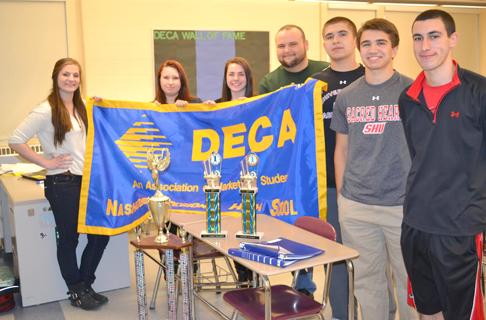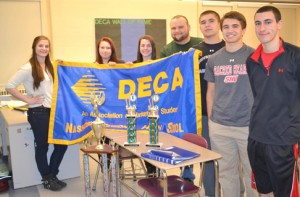
By Ann Needle

A successful business is a growing one. Just by that standard, Nashoba Regional High School DECA chapter (Distributive Education Clubs of America) is an unqualified smash. Since 2010, membership has exploded, along with members qualifying for state and national competitions.
This month, NRHS DECA is preparing to send 17 members to the international competition in Atlanta, which runs May 3 through 8. There were 23 who qualified, but some had other commitments and could not attend the event. Nashoba DECA was sending less than five members to internationals as recently as last year.
“The three we had going last year was considered a big deal” in terms of number of students making it from a single high school, according to Stavros Andreopoulos, NRHS DECA’s adviser and a Business teacher at Nashoba. He noted that anyone placing at least fourth in a given category was invited to the Atlanta competition.
DECA’s stated mission is to prepare emerging leaders and entrepreneurs in marketing, finance, hospitality, and management, in high schools and colleges worldwide. It claims chapters in 50 states and six countries. DECA estimated that a total of 16,000 high school students, advisers, and business representatives will attend the international competition in Atlanta next month.
With the rigorous project requirements put to competitors at the state level, the number of qualifiers for Atlanta that Nashoba is sending seems even more impressive. For the state finals, students could choose to write a 30-page paper detailing a business plan for a specific company or organization they selected, and then give a 15-minute presentation describing the plan at the competition. Or, competitors could decide to accept two as-yet unknown business challenges, and then come up with a sales and business strategy for each on the spot, pitching the solution or product to a panel of judges.
Stow’s Michaela Colarossi, along with Bolton’s Abby Jacaruso and Kirstin Noonan, wrote and presented a research paper to help devise fundraising strategies for NEADS in Princeton, Mass., a nonprofit providing training and placement for guide dogs for the deaf and otherwise disabled. Colarossi explained that the team raised about $1,000 for the organization through several fundraisers, including one where the team brought a puppy into NRHS and allowed students to handle the pup in exchange for donations. The team placed second in the state competition’s Community Service category, she added.
Senior Mark Puleo of Bolton took on the surprise challenges in Sports and Entertainment Marketing. One of the prompts involved cooking up a plan for selling television subscription plans. He agreed that, yes, there are shades of the TV reality show Shark Tank here, where guests pitch product ideas to judges, hoping one of the judges will finance the product’s development.
Another project, featuring a familiar company, came from senior Jackie Kalinowski of Fitchburg, teamed with another student to write a business plan for shoring up the sagging image of young adult clothing chain Abercrombie & Fitch. Among the advice Kalinowski reported that the team laid out was for more lighting in the company’s notoriously dark stores, for the chief executive officer to carefully control what he says, and for a greater variety of clothing sizes. (Several months ago, the CEO stated that A&F purposely does not make its clothes above certain sizes, as it does not want larger customers wearing their line.)
The Biggest Challenge: Getting There
An old business adage tells of success breeding success, and NRHS DECA is no exception. Andreopoulos maintained that, since he arrived at Nashoba four years ago, growth in NRHS DECA membership has led to more competition, with alumnae coming back to coach, giving NRHS a bigger edge. These days, NHRS DECA claims 110 members, or what Andreopoulos noted is about 10 percent of the school. This is up from 22 members in 2010.
With business being business, the fact is that attending competitions doesn’t come cheaply. Rough estimates from Andreopoulos put the price tag of attending, with hotel accommodations, at about $800 for each of the 17 attendees, not including transportation and chaperones’ costs. Adding in costs for student participation in the year’s district and state competitions, by Andreopoulos’s calculations, the group needs to raise anywhere from $20,000 to $30,000 to help make this year’s activities affordable. So far, NRHS DECA has raised about $7,000 for the year, he added.
Even if a student is not planning a business career, DECA can be worth the competitive and fundraising efforts. As Michaela Colarossi, who plans a career in teaching, said, “It opened our eyes as to how we could make a difference.”
Anyone wanting to make a tax-deductible contribution to NRHS DECA can send it to Nashoba Regional High School, c/o Nashoba DECA, 12 Green Rd., Bolton, MA, 01740. Any questions can be sent to Stavros Andreopoulos, at sandreopoulus@nrsd.net.